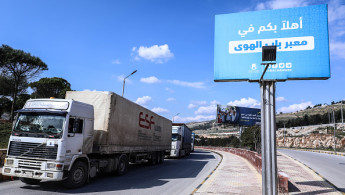UN says Syria to open two border crossings for quake aid, but no binding Security Council resolution for now
The UN chief said Monday that Syrian President Bashar al-Assad has agreed to open two more border crossings to allow in aid to help victims of the earthquake that has left more than 37,000 dead in the region, but the UN Security Council will not pass a binding resolution to push it through for the time being.
Before the earthquake struck, almost all of the crucial humanitarian aid for the more than four million people living in rebel-controlled areas of northwestern Syria was being delivered from Turkey through one conduit - the Bab al-Hawa crossing.
"Opening these crossing points - along with facilitating humanitarian access, accelerating visa approvals and easing travel between hubs - will allow more aid to go in, faster," said UN Secretary-General Antonio Guterres.
He said Assad had agreed to open the two crossing points of Bab Al-Salam and Al Raee from Turkey to northwest Syria for an initial period of three months to allow for the timely delivery of humanitarian aid.
The Turkish ambassador to the UN, Feridun Sinirlioğlu, told Al-Araby Al-Jadeed’s correspondent in New York Turkey was ready to open two additional border crossings between Turkey and northwest Syria for the passage of humanitarian aid.
He said it was up to the UN to decide whether it required a Security Council resolution to open them. This was raised by French Ambassador to the UN in New York, Nicolas de Rivière, who said that the Security Council should adopt a binding resolution under Chapter 7 to open additional crossings aside from Bab al-Hawa in case of obstructions at the crossings.
The UN chief noted that with the toll from the earthquake still rising, and with survivors exposed to harsh winter conditions in war-torn Syria, "delivering food, health, nutrition, protection, shelter, winter supplies and other life-saving supplies to all the millions of people affected is of the utmost urgency."
The announcement of new crossings came a day after World Health Organization chief Tedros Adhanom Ghebreyesus met Assad in Damascus to discuss the response to the devastating earthquake that hit Syria and Turkey last week.
The situation is particularly dire in the rebel-held area in the northwest of Syria, which cannot receive aid convoys from government-held parts of the country without Damascus's authorisation.
The lone border crossing open to shuttle aid from Turkey also saw its operations disrupted by the quake.
Humanitarian aid in rebel-held areas usually arrives through Turkey via a cross-border mechanism created in 2014 by a UN Security Council resolution.
But it has long been contested by Damascus and its ally Moscow, who see it as a violation of Syrian sovereignty.
Under pressure from Russia and China, the number of crossing points has been reduced over time from four to one.
A Race Against Time: A devastating earthquake lays waste to Turkey and Syria (@TheNewArabVoice: s6; ep5) - https://t.co/TKUwyEmrpd pic.twitter.com/7S5trP9ASB
— The New Arab (@The_NewArab) February 13, 2023
The WHO chief said Sunday after meeting Assad that "the compounding crises of conflict, Covid, cholera, economic decline and now the earthquake have taken an unbearable toll."
The United States said new border openings would be a positive for Syria if Assad is serious about the pledge to open them.
"If the regime is serious about this, and if the regime is willing to put those words into action, that would be a good thing for the Syrian people," State Department spokesman Ned Price told reporters.
The head of a Syrian opposition-run rescue group on Tuesday denounced the UN decision, saying it gave him "free political gain".
"This is shocking and we are at loss at how the UN is behaving," Raed al Saleh, head of the rescue group known as the White Helmets, told Reuters.
The White Helmets, famous for rescuing people trapped in bombed buildings during Syria's 12-year civil war, said the death toll from the earthquake in the northwest was 2,274.
Many residents of the region were already displaced by Russian and Syrian bombing in the course of the war.
Large deliveries of aid from Saudi Arabia and Qatar have begun arriving in the rebel-held enclave ahead of UN deliveries, Saleh said.
"They will make a big difference because they are entering directly," he said.





 Follow the Middle East's top stories in English at The New Arab on Google News
Follow the Middle East's top stories in English at The New Arab on Google News

![MP Essam Diab's pursuit to block TikTok in Egypt has revived an already ongoing debate in the country. [Getty]](/sites/default/files/styles/image_330x185/public/1230748046.jpeg?h=a5f2f23a&itok=-8MqBLLC)
